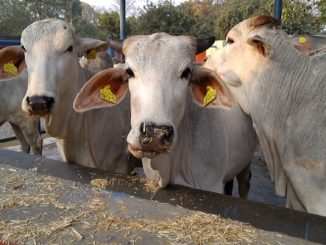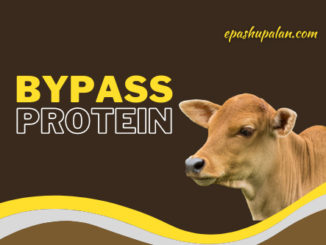Dietary protein source which escapes rumen degradation and microbial protein that synthesized in the rumen are the source of amino acid for ruminants animals. Protein solubility and the rate of passage to the small intestine will determine the amount of protein that escapes from rumen degradation. Quantity of plant organic matter fermented, ammonia and mineral concentration in the rumen regulate Microbial protein synthesis. The normal sources of dietary protein do not fully provide all the amino acids required by the animals. Protein supplements are more expensive and increase the feed cost. By optimizing the use of protein supplement within the ruminant system, we can either reduce the quantity of protein in the diet or can enhance the production of the animals. Dairy Bypass Protein is an animal or plant-based protein source that resists degradation in the cow’s rumen in order to pass into the lower gastrointestinal tract and provide essential amino acids to the cow.
Degradation Of Proteins And Amino Acids In The Rumen
In rumen food proteins get hydrolysed into peptides and amino acids by microorganisms. However, most amino acids rapidly degraded to organic acids, ammonia and carbon dioxide. For bacterial growth the ammonia produced is the primary nitrogenous nutrient. some species of ruminal bacteria use peptides directly for synthesis of microbial protein. As little as 40 per cent or as high 80 per cent of dietary protein normally degraded in the rumen (RDP) and transferred into microbial protein. Ruminal degradation of proteins should be minimized by artificial procedures because this protein production is an energy dependent mechanism, the amount of dietary protein transformed into microbial protein must be an important aspect of nitrogen economy. Other than ammonia (NPN compound) contributes 25-50 per cent of nitrogen to rumen microbial population. These presumably intact amino acids or peptides which originate either directly from food protein, from recycled nitrogen to rumen or from turnover of bacterial and protozoal protein within rumen. The breakdown of proteins by microorganisms, gives rise to intermediate products such as free amino acids in the rumen. Most of the free amino acids are deaminated to yield ammonia and other intermediate products some of the free amino acids in the rumen can be assimilated directly by microbes and can absorb through the rumen. The maintenance requirement of animals can be met alone by the microbial protein. But in young growing cattle and lactating cows in addition to microbial protein bypass protein is essential to meet their metabolizable protein requirements. The protein can be divided in two parts, ‘Rumen Degradable Protein’ (RDP) which is major part of protein and is degradable in rumen, and a small but variable amount of dietary protein escape rumen degradation ‘Un-degradable Dietary Protein (UDP).
Proteins Can Be Artificially Protected From Ruminal Degradation By Following Methods
A. Chemical protection
Proteins are chemically protected by treating with substances like tannins, formaldehyde, glutaraldehyde, glyoxal and hexa-methylenetetramine. Formaldehyde treatment is most commonly used. 0.5-1.5, 1-3 and 3-5% formaldehyde is used for protein protection in concentrates, hay and silage respectively.
Treating protein meals with formaldehyde has the following advantages
- Desired level of protein protection can be achieved
- Under and over protection of proteins can be eliminated
- The bio-availability of the essential amino acids can be maximized.
- It does not increase the proportion of ADIN and NDIN contents
- Economical
- The HCHO treatment of groundnut cake arrests further growth of fungi and thus production of mycotoxins in the cake.
B. Heat treatment
Heat treatment causes denaturation of proteins which provides effective protection against microbial attack. Heat treatment at higher temperatures reduces the availability of some amino acids like cystine, arginine so to reduce such losses, steam treatment has been found fruitful.
Effects Of Bypass Proteins On Animal Performance
Biochemical and nutritional basis by which bypass protein show its effect on animal performance are
- Additional supply of amino acids at intestinal and tissue level
- Lower ammonia production in the rumen because proteins are fermented to ammonia and low degradation of protein will lower ammonia
- Lower urea synthesis in liver as ammonia is being absorbed at lower level which saves
- Excess amino acids go for Gluconeogenesis
- Higher availability of amino acids per unit of feed.
- Better utilization of protein meals having higher rumen protein degradability.
- Improves growth and milk production.
- Improves protein percent in milk, hence SNF content of milk
- Improves fat percent in milk.
- Better economic returns, for same input cost.
- Useful for low and high yielding animals, relevant to Indian conditions of feeding and management.
1. Growth Performance
The growth rate of animal’s significant increases by feeding of bypass protein meals. It, not only increases growth rate, but also improve feed conversion efficiency. In fact, which results in reduction in the cost of rearing, and due to higher growth rate, it also results in attaining early maturity by male or female animals.
2. Lactating Performance
Feeding of bypass proteins increases milk yield. The increase in milk yield varied in the range of 8 – 10 percent. The studies conducted on medium producing animals, proved that bypass protein feeding can be beneficial to the animals, producing 8-10 liters of milk per day. Voluntary feed intake stimulated by Bypass protein, which increase quality milk production and thereby improve economic status from dairy cows farming.
3. Reproductive efficiency
The young stock can attain early maturity to start the reproductive life at an earlier age because of high growth rate caused through protein feeding. It has been shown that bypass protein feeding can improve the reproductive efficiency of breeding buffalo bulls and cross bred bucks, both with respect to sexual behavior, including libido score as well as the seminal attributes like ejaculate volume, mass activity and sperm count per ml, similar positive results were obtained in females, where the conception rate decreased after feeding of bypass proteins.
Conclusion
High yielding dairy animals have high nutritional requirement. During early lactation, if the dietary intake is less than the milk production, they can reach negative energy balance. Feeding of bypass proteins is one of the best methods to meet these requirements. As it directly reach the small intestines escaping the rumen degradation and is available to meet high protein demands of animal. Bypass proteins will also help to maintain normal fertility. Supplementation of bypass protein to medium and high yielding growing animals increases the live weight gain, DM intake and milk production in animals.








please let me know the process of making by pass protein by formaldehydrate treatment